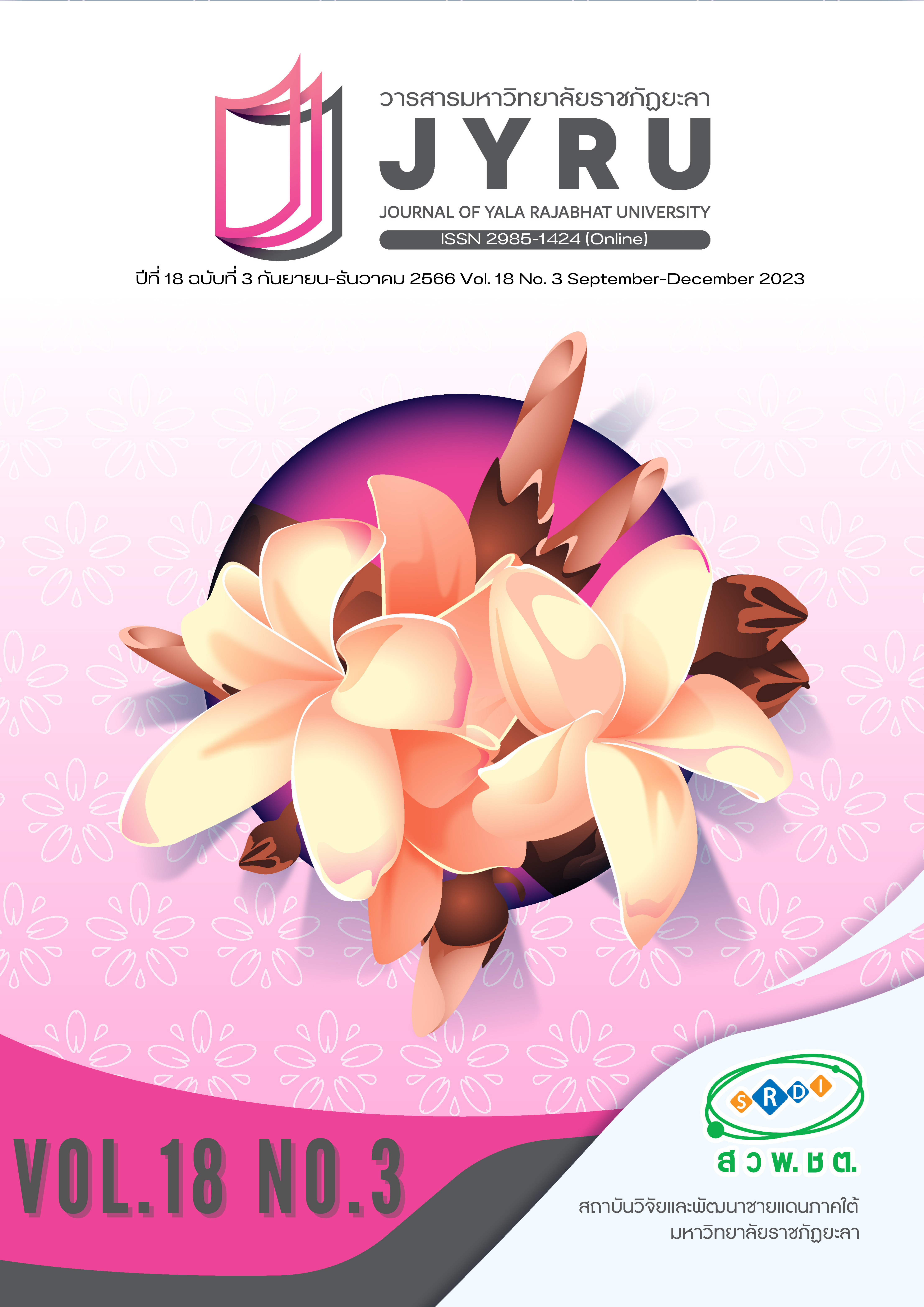การพัฒนาชุดกิจกรรมอันปลั๊กโค้ดดิ้งร่วมกับสื่อความเป็นจริงเสริมเพื่อส่งเสริมทักษะการเขียนโปรแกรม สำหรับนักเรียนชั้นประถมศึกษาปีที่ 4 ในโรงเรียนขนาดเล็ก
Main Article Content
บทคัดย่อ
ทักษะการเขียนโปรแกรมเป็นทักษะการแก้ปัญหารูปแบบหนึ่งที่จำเป็นสำหรับนักเรียนในศตวรรษที่ 21 ซึ่งโรงเรียนขนาดเล็กประสบปัญหาในการจัดการเรียนรู้ให้กับนักเรียน การวิจัยครั้งนี้จึงมีวัตถุประสงค์เพื่อ 1) พัฒนาและทดสอบประสิทธิภาพของชุดกิจกรรมอันปลั๊กโค้ดดิ้งร่วมกับสื่อความเป็นจริงเสริม 2) ศึกษาทักษะการเขียนโปรแกรมจากการเรียนรู้ด้วยชุดกิจกรรม 3) ศึกษาความพึงพอใจของนักเรียน กลุ่มตัวอย่างในการวิจัยเป็นนักเรียนชั้นประถมศึกษาปีที่ 4 โรงเรียนขนาดเล็ก จำนวน 28 คน (นักเรียนโรงเรียนบ้านเจาะบาแน จำนวน 17 คน และโรงเรียนบ้านด่าน จำนวน 11 คน) โดยใช้วิธีการสุ่มตัวอย่างแบบกลุ่ม เครื่องมือที่ใช้ในการวิจัยประกอบด้วย 1) ชุดกิจกรรมอันปลั๊กโค้ดดิ้งร่วมกับสื่อความเป็นจริงเสริม 2) แผนการจัดการเรียนรู้ประกอบการใช้ชุดกิจกรรม 3) แบบทดสอบวัดทักษะการเขียนโปรแกรม และ 4) แบบประเมินความพึงพอใจ สถิติที่ใช้ในการวิเคราะห์ข้อมูล 1) ประสิทธิภาพของชุดกิจกรรมตามเกณฑ์ E1/E2 2) สถิติเชิงอนุมาน ได้แก่ การทดสอบกลุ่มตัวอย่าง 1 กลุ่ม และการทดสอบข้อมูล 2 กลุ่มที่ไม่อิสระต่อกัน 3) สถิติเชิงพรรณนา ได้แก่ ค่าเฉลี่ย และส่วนเบี่ยงเบนมาตรฐาน ผลการวิจัยพบว่า 1) ประสิทธิภาพของชุดกิจกรรมมีค่าเท่ากับ 74.13/76.79 เป็นไปตามเกณฑ์ 70/70 2) คะแนนทักษะการเขียนโปรแกรมของนักเรียนหลังเรียนรู้ด้วยชุดกิจกรรมสูงกว่าก่อนเรียนและสูงกว่าเกณฑ์ร้อยละ 70 อย่างมีนัยสำคัญทางสถิติที่ระดับ .05 และ 3) คะแนนเฉลี่ยระดับความพึงพอใจของนักเรียนที่เรียนรู้ด้วยชุดกิจกรรมอยู่ในระดับมากที่สุด ( = 4.22, S.D. = 0.24) ผลการศึกษาดังกล่าวถือเป็นแนวทางการจัดการเรียนรู้การเขียนโปรแกรมภายใต้บริบทจำกัดโดยเฉพาะในโรงเรียนขนาดเล็กได้เป็นอย่างดี
Article Details

อนุญาตภายใต้เงื่อนไข Creative Commons Attribution-NonCommercial-NoDerivatives 4.0 International License.
บทความ ข้อมูล เนื้อหา รูปภาพ ฯลฯ ที่ได้รับการเผยแพร่ในวารสารมหาวิทยาลัยราชภัฏยะลานี้ ถือเป็นลิขสิทธิ์ของวารสารมหาวิทยาลัยราชภัฏยะลา หากบุคคลหรือหน่วยงานใดต้องการนำทั้งหมดหรือส่วนหนึ่งส่วนใดไปเผยแพร่ต่อหรือกระทำการใดๆ จะต้องได้รับอนุญาตเป็นลายลักษณ์อักษรจากวารสารมหาวิทยาลัยราชภัฏยะลาก่อนเท่านั้น
เอกสารอ้างอิง
Chalermdit, J., Wittayakhom, N. & Jeerungsuwan, N. (2018). Challenges on augmented reality for education 4.0. Journal of Education Naresuan University, 20(2), 266–279. (in Thai)
Kalasin Provincial Education Office. (2020). A study the management of small schools in Kalasin province. [Research report]. Kalasin: Supervision, Monitoring and Evaluation Group Kalasin Provincial Education Office. (in Thai)
Kanchanachaya, N. & Nitjarunkul, K. (2019). Development of instructional media production capability of pre - service teachers through augmented reality books. Journal of Education, 30(3), 148–159. (in Thai)
Kariji, N., Saelee, V. & Adulyasas, L. (2022). Developing mathematics achievement in 2D and 3D geometric shapes using electronic book incorporating augmented reality for grade 7 students under the new normal learning. In The proceedings of the 7th National Science and Technology Conference, March 10-11, 2022. Yala: Yala rajabhat university. (in Thai)
Na Ubol, P. & Chai-ngam, R. (2022). The study of the effect of unplugged coding leaning activity on computational thinking skill of grade 3 students. Journal of Education Rajabhat Mahasarakham University, 19(2), 144–153. (in Thai)
National Institute of Educational Testing Service. (2022). National educational test report basic (O-NET)[Online]. Retrieved August 20, 2022, from: http://www.newonetresult.niets.or.th/Announcement Web/School/ReportSchoolBySchool.aspx?mi=2. (in Thai)
Nilee, S., Sulong, S. & Pangtip, P. (2022). Results of using the unplugged coding activity package on going to study in the COVID-19 era to enhance problem solving in technology (Computational Science) for Prathomsuksa 1 students. In The proceedings of the 7th National Science and Technology Conference, March 10-11, 2022. Yala: Yala Rajabhat University. (in Thai)
Office of the Basic Education Commission. (2017). Learning standards and indicators Mathematics, Science and Geography in the subject group for social studies, religion and culture (Revised version 2017) according to the basic education core curriculum, 2008. Bangkok: The Agricultural Co-operative Federation of Thailand. (in Thai)
Office of the Basic Education Commission. (2018). Know computational science. Bangkok: Education Supervisor OBEC. (in Thai)
Office of the Basic Education Commission. (2021). Unplugged coding (elementary school) remote area school edition. Tak: Project Five - Four. (in Thai)
Pattani Primary Educational Service Area Office 2. (2022). Information year 2022 [Online]. Retrieved August 20, 2022, from: https://activity.pattani2.go.th/detail_download.php?aid=895.
Srifa, P. (2013). Turn 3D roles into the world of virtual reality (augmented reality). Lecture document. Nakhon Pathom: Faculty of Education Silpakorn University. (in Thai)
Sumlee, P. & Phumpuang, K. (2021). The development of unplugged coding learning activity series to enhance computational thinking skills for students in kindergarten 3. Journal for Research and Innovation, 4(2), 181–198. (in Thai)
Teravecharoenchai, T. & Bunjongparu, N. (2020). Synthesis for performance and behavior indicators of coding skills for early childhood. [Research report]. Bangkok: Curriculum and Instruction Faculty of Education Ramkhamhaeng University. (in Thai)
The Institute for the Promotion of Teaching Science and Technology. (2018). Basic science curriculum manual science learning group (Revised edition 2017) according to the basic education core curriculum, 2008, technology (computing science) elementary and secondary levels. Bangkok: The Institute for the Promotion of Teaching Science and Technology. (in Thai)
Threekunprapa, A. & Yasri, P. (2020). Unplugged coding using flowblocks for promoting computational thinking and programming among secondary school students. International Journal of Instruction, 13(3), 207–222.


